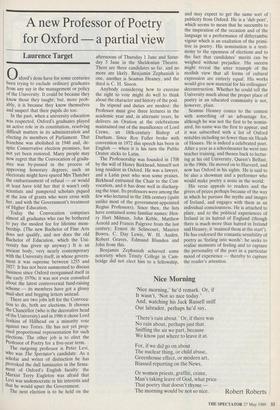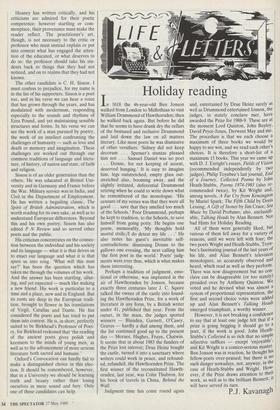A new Professor of Poetry for Oxford a partial view
Laurence Target
Oxford's dons have for some centuries been trying to exclude ordinary graduates from any say in the management or policy of the University. It could be because they know those they taught; but, more prob- ably, it is because they know themselves and suspect that their pupils do too. In the past, when a university education was respected, Oxford's graduates played an active role in its constitution, resolving difficult matters in its administration and electing its members of Parliament. That franchise was abolished in 1948 and, de- spite Conservative election promises, has not yet been restored. Many people may now regret that the Convocation of gradu- ates was by-passed in the process of approving honorary degrees; such an electorate might have spared Mrs Thatcher the embarrassment of refusal — or would at least have told her that it wasn't only scientists and pampered scholars piqued at the loss of grants who were cross with her, and with the Government's treatment of Higher Education. Today the Convocation comprises almost all graduates who can be bothered to pay the modest fee for lifetime mem- bership. (The new Bachelor of Fine Arts does not qualify, and nor does the old Bachelor of Education, which the Uni- versity has given up anyway.) It is an ancient body, very nearly contemporary with the University itself, in whose govern- ment it was supreme between 1255 and 1857. It has not been summoned to discuss business since Oxford reorganised itself in the early 1970s; it was not even consulted about the latest controversial fund-raising scheme — its members have got a glossy Mail-shot and begging letters instead.
There are two jobs left for the Convoca- tion to do, both are elections. It chooses the Chancellor (who is the decorative head of the Uniyersity) and in 1986 it chose Lord Jenkins of Hillhead on a minority vote against two Tories. He has not yet prop- osed proportional representation for such elections. The other job is to elect the Professor of Poetry for a five-year term. The outgoing professor is Peter Levi, who was The Spectator's candidate. As a scholar and writer of distinction he has provoked the dull luminaries in the firma- ment of Oxford's English faculty: the Marxist Terry Eagleton was afraid that Levi was undemocratic in his interests and that he would upset the Government. The next election is to be held on the afternoons of Thursday 1 June and Satur- day 3 June in the Sheldonian Theatre. There are three candidates so far, and no more are likely. Benjamin Zephaniah is one, another is Seamus Heaney, and the third is C. H. Sisson.
Anybody considering how to exercise the right to vote might do well to think about the character and history of the post.
Its stipend and duties are modest: the Professor must give three lectures in the academic year and, in alternate years, he delivers an Oration at the celebrations maintained out of the munificence of Lord Crewe, an 18th-century Bishop of Durham. Since Roy Fuller broke with convention in 1972 this speech has been in English — when it is his turn the Public Orator sticks to Latin.
The Professorship was founded in 1708 by the will of Henry Birkhead, himself not long resident in Oxford. He was a lawyer, and a Latin poet who won some praises. Birkhead entrusted the Chair to the Con- vocation, and it has done well in discharg- ing the trust. Its professors were among the few who lectured in the 18th century (quite unlike most of the government-appointed Regius Professors). Since then, the lists have contained some familiar names: Hen- ry Hart Milman, John Keble, Matthew Arnold and Francis Palgrave from the last century; Ernest de Selincourt, Maurice Bowra, C. Day Lewis, W. H. Auden, Robert Graves, Edmund Blunden and John from this.
Benjamin Zephaniah achieved some notoriety when Trinity College in Cam- bridge did not elect him to a fellowship, and may expect to get the same sort of publicity from Oxford. He is a 'dub poet', which seems to mean that he succumbs to the inspiration of the occasion and of the language in a performance of dithyrambic vigour which is an exaltation of the primi- tive in poetry. His nomination is a testi- mony to the openness of elections and to the fact that candidates' merits can be weighed without prejudice. His success might reveal the utter triumph of the modish view that all forms of cultural expression are entirely equal. His works would give new material for his colleagues' deconstruction. Whether he could tell the University much about the proper place of poetry in an educated community is not, however, plain.
Seamus Heaney comes to the contest with something of an advantage for, although he was not the first to be nomin- ated, his name was the first to appear, and it was subscribed with a list of Oxford notables including no fewer than six Heads of Houses. He is indeed a celebrated poet. After a year as a schoolmaster he went into teacher training, and thence back to lectur- ing at his old University, Queen's Belfast, in the 1960s. He moved on to Harvard, and now has Oxford in his sights. He is said to be also a showman and a performer who would make poetry a noise in the world.
His verse appeals to readers and the givers of prizes perhaps because of the way in which he pursues the myths and images of Ireland, and engages with them as an individual consciousness. He is attached to place, and to the political experiences of Ireland in its hatred of England (though there is much more than hatred in Ireland and Heaney, it 'maimed them at the start'). He has endorsed the romantic sensibility of poetry as 'feeling into words': he seeks to realise moments of feeling and to capture the personality of the poet in a particular mood of experience — thereby to capture the reader's attention. Heaney has written critically, and his criticisms are admired for their poetic competence: however startling or com- monplace, their provenance must make the reader reflect. The practitioner's art, though, is not necessary to the critic or professor who must instead explain or put into context what has engaged the atten- tion of the educated, or what deserves to do so: the professor should take his stu- dents back to things that they had not noticed, and on to realms that they had not known.
The other candidate is C. H. Sisson. I must confess to prejudice, for my name is in the list of his supporters. Sisson is a poet too, and in his verse we can hear a voice that has grown through the years, and has modulated with modernism, responding especially to the sounds and rhythms of Ezra Pound, and yet maintaining sensible structures and forms. In his verse we can see the work of a man pursued by poetry, the work of an intellect confronting the challenges of humanity — such as love and death or memory and imagination. These challenges are worked out through our common traditions of language and litera- ture, of history, of nation and state, of faith and religion.
Sisson is of an older generation than the others. He was educated at Bristol Uni- versity and in Germany and France before the War. Military service was in India, and Civil in the Department of Employment. He has written a beguiling classic, The Spirit of British Administration, which is worth reading for its own sake, as well as to understand European differences. Beyond this and his own poetry, Sisson has also edited P N Review and so served other poets and the public.
His criticism concentrates on the connec- tion between the individual and his society and its language — what it is that drives us to enact our language and what it is that spurs us into song. 'What will this man say?' has been the question which has taken me through the volumes of his work. And the answer has been startling, allur- ing, and yet expected — much like making a new friend. His work is particular to a time and a place, now and in England. But its roots are deep in the European tradi- tion, brought to flower in his translations of Virgil, Catullus and Dante. He has considered the poets and has tried to put them into context. He is, in short, perfectly suited to be Birkhead's Professor of Poet- ry, for Birkhead reckoned that 'the reading of the ancient poets gives polish and keenness to the minds of young men, as well as to the advancement of more serious literature both sacred and humane.'
Oxford's Convocation can hardly fail to make a distinguished choice in this elec- tion. It should be remembered, however, that in a University we should be learning truth and beauty rather than losing ourselves in mere sound and fury. Only one of these candidates can help.



















































 Previous page
Previous page